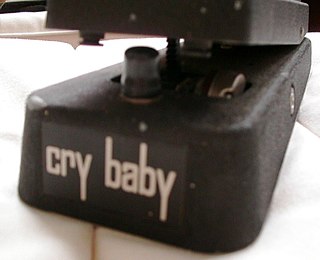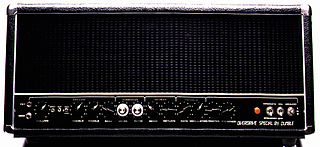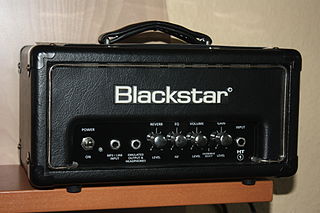
A wah-wah pedal, or simply wah pedal, is a type of effects pedal designed for electric guitar that alters the timbre of the input signal to create a distinctive sound, mimicking the human voice saying the onomatopoeic name "wah-wah". The pedal sweeps a band-pass filter up and down in frequency to create a spectral glide. The wah-wah effect originated in the 1920s, with trumpet or trombone players finding they could produce an expressive crying tone by moving a mute in, and out of the instrument's bell. This was later simulated with electronic circuitry for the electric guitar when the wah-wah pedal was invented. It is controlled by movement of the player's foot on a rocking pedal connected to a potentiometer. Wah-wah effects may be used without moving the treadle as a fixed filter to alter an instrument’s timbre, or to create a "wacka-wacka" funk-styled rhythm for rhythm guitar playing.

An instrument amplifier is an electronic amplifier that converts the often barely audible or purely electronic signal of a musical instrument into a larger electronic signal to feed to a loudspeaker. An instrument amplifier is used with musical instruments such as an electric guitar, an electric bass, electric organ, electric piano, synthesizers and drum machine to convert the signal from the pickup or other sound source into an electronic signal that has enough power, produced by a power amplifier, to drive one or more loudspeaker that can be heard by the performers and audience.

A guitar amplifier is an electronic device or system that strengthens the electrical signal from a pickup on an electric guitar, bass guitar, or acoustic guitar so that it can produce sound through one or more loudspeakers, which are typically housed in a wooden cabinet. A guitar amplifier may be a standalone wood or metal cabinet that contains only the power amplifier circuits, requiring the use of a separate speaker cabinet–or it may be a combo amplifier, which contains both the amplifier and one or more speakers in a wooden cabinet. There is a wide range of sizes and power ratings for guitar amplifiers, from small, lightweight practice amplifiers with a single 6-inch speaker and a 10-watt amp to heavy combo amps with four 10-inch or four 12-inch speakers and a 100-watt amplifier, which are loud enough to use in a nightclub or bar performance.

Brad Douglas Paisley is an American country music singer, songwriter, and guitarist. His first success came in 1997 as the writer of David Kersh's "Another You". After this, he signed with Arista Nashville in 1998 and released his debut album Who Needs Pictures in 1999. This was the first of twelve studio albums he would release for the album before its closure in 2023, after which he transferred to EMI Nashville. His most commercially successful albums are Mud on the Tires (2003) and Time Well Wasted (2005), both certified double-platinum by the Recording Industry Association of America (RIAA).

Marshall Amplification is a British company that designs and manufactures music amplifiers and speaker cabinets. Founded in London by shop owner and drummer Jim Marshall, the company is based in Bletchley, Milton Keynes, England. Since March 2023, Marshall Amplification has been one of several divisions of the Swedish conglomerate, the Marshall Group.

"The Devil Went Down to Georgia" is a song written and recorded by American music group Charlie Daniels Band and released on their 1979 album Million Mile Reflections.

The moonwalk, or backslide, is a popping dance move in which the performer glides backwards but their body actions suggest forward motion. It became popular around the world when Michael Jackson performed the move during the performance of "Billie Jean" on Motown 25: Yesterday, Today, Forever, which was broadcast in 1983. He included the moonwalk in tours and live performances. Jackson has been credited as renaming the "backslide" to the moonwalk and it became his signature move.

Leslie Abel West was an American guitarist, singer and songwriter. He was the co-founder, guitarist and co-lead vocalist of the rock band Mountain. West was named the 245th greatest guitarist of all time by Rolling Stone in 2023.

Dumble was a guitar amplifier manufacturer in Los Angeles, California.

James Donald Root is an American guitarist. He is one of two guitarists for heavy metal band Slipknot, in which he is designated #4, as well as the former lead guitarist for rock band Stone Sour.
Roddis Franklin "Pete" Drake was a Nashville-based American record producer and pedal steel guitar player. One of the most sought-after backup musicians of the 1960s, Drake played on such hits as Lynn Anderson's "Rose Garden", Charlie Rich's "Behind Closed Doors", Bob Dylan's "Lay Lady Lay", and Tammy Wynette's "Stand by Your Man". Drake was inducted into the Musicians Hall of Fame and Museum in 2007, and the Country Music Hall of Fame in 2022.

A bass amplifier is a musical instrument electronic device that uses electrical power to make lower-pitched instruments such as the bass guitar or double bass loud enough to be heard by the performers and audience. Bass amps typically consist of a preamplifier, tone controls, a power amplifier and one or more loudspeakers ("drivers") in a cabinet.

Distortion and overdrive are forms of audio signal processing used to alter the sound of amplified electric musical instruments, usually by increasing their gain, producing a "fuzzy", "growling", or "gritty" tone. Distortion is most commonly used with the electric guitar, but may also be used with other electric instruments such as electric bass, electric piano, synthesizer and Hammond organ. Guitarists playing electric blues originally obtained an overdriven sound by turning up their vacuum tube-powered guitar amplifiers to high volumes, which caused the signal to distort. While overdriven tube amps are still used to obtain overdrive, especially in genres like blues and rockabilly, a number of other ways to produce distortion have been developed since the 1960s, such as distortion effect pedals. The growling tone of a distorted electric guitar is a key part of many genres, including blues and many rock music genres, notably hard rock, punk rock, hardcore punk, acid rock, grunge and heavy metal music, while the use of distorted bass has been essential in a genre of hip hop music and alternative hip hop known as "SoundCloud rap".

Manualism is the art of playing music by squeezing air through the hands. Because the sound produced has a distinctly flatulent tone, such music is usually presented as a form of musical comedy or parody. The musical performer is called a manualist, who may perform a cappella or with instrumental accompaniment.

Guitarist is a British monthly music-making magazine published by Future plc. First published in 1984, It is the longest-established European guitar-player magazine, and is currently the biggest-selling guitar magazine in the UK. The current editor Jamie Dickson, has had the position since late 2013. Each issue covers three areas: reviews, interview and technique. This may include reviews of newly released guitars, amplifiers and other equipment; interviews with famous and up-and-coming guitar players; and features on the guitar industry, news articles, playing technique with tablature. Guitarist's slogan was previously "The Guitar Player's Bible", before changing in 2012 to "The Guitar Magazine".

Randall Amplifiers is a manufacturer of solid-state and tube guitar amplifiers. Randall Amplifiers is currently a brand of U.S. Music Corp., a subsidiary of Canadian corporate group Exertis | JAM.

Blackstar Amplification is a British company that produces and manufacturers guitar amplifiers and effects units. The company was founded by a group of ex-Marshall employees, most notably Bruce Keir, who became technical Director at Blackstar, and former Chief Design Engineer at Marshall, Ian Robinson. In 2009 the company began operations in the United States. The majority of the research and development for Blackstar is carried out in the UK. Blackstar is endorsed by major artists like Ozzy Osbourne, Neal Schon, Opeth, and Richie Sambora of Bon Jovi. Blackstar has been consistently ranked amongst the best amplification brands by leading guitarists. Bruce Keir died in September 2021 at the age of 60.

Fuzz bass is a style of playing the electric bass or modifying its signal that produces a buzzy, distorted, overdriven sound, as the name implies. Overdriving a bass signal significantly changes the timbre, adds higher overtones (harmonics), increases the sustain, and, if the gain is turned up high enough, creates a "breaking up" sound characterized by a growling, buzzy tone.

The Slow Mo Guys is a science and technology entertainment web series from Thame, England, created and owned by Gavin Free, starring himself and Daniel Gruchy. It has been described as the biggest channel for slow motion videos on YouTube.


















